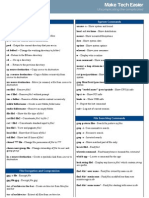0 ratings0% found this document useful (0 votes)
9 viewsLinux Cheat Sheet Basic Console Commands
Uploaded by
Mohammad RahmaniCopyright
© © All Rights Reserved
We take content rights seriously. If you suspect this is your content, claim it here.
Available Formats
Download as PDF, TXT or read online on Scribd
0 ratings0% found this document useful (0 votes)
9 viewsLinux Cheat Sheet Basic Console Commands
Uploaded by
Mohammad RahmaniCopyright
© © All Rights Reserved
We take content rights seriously. If you suspect this is your content, claim it here.
Available Formats
Download as PDF, TXT or read online on Scribd
You are on page 1/ 1
CHEAT SHEET
LINUX - basic console commands
Software managing Exploring
dowloads latest software / packages list home folder shortcut
$ sudo apt update ~ (equals to /home/user_name/)
updates software based on previosly downloaded list root folder
$ sudo apt upgrade /
installs specific software list all files in a current diectory (included hidden)
$ sudo apt install package_name $ ls -al
find location of package files/binaries current working directory path
$ whereis package_name $ pwd
removes software but keeps configuration files change current directory to home
$ sudo apt remove package_name $ cd
removes software and configuration files change current directory to destination_path
$ sudo apt purge package_name $ cd destination_path (i.e cd ~)
shows all installed packages change current directory to one level up
$ apt list --installed $ cd ..
shows if a package is installed history of inputed commands
$ apt list -installed package_name $ history
searches installed packages based on a name manual for a command
$ dpkg -l | grep -i put_your_search_name_here $ man command_name (i.e. man cp)
shows available packages by pattern
$ apt search package-name
Files & folders
create a file
System info $ touch file_name.extension
top current processes + resources usage summary create a folder
$ top $ mkdir folder_name
Linux version copy
$ lsb_release -a $ cp ~/path_file_to_copy ~/destination (single file)
$ cp -R ~/path_to_folder ~/destination (single folder)
System info $ cp ~/*.extension ~/destination (all files with ext)
$ sudo dmidecode -t system
move
Kernel info $ mv ~/file_or_directory_to move ~/destination
$ uname -a
remove
current time and date $ rm ~/file_to_remove.extension (single file)
$ timedatectl $ rm -R ~/folder_to_remove (single folder)
$ date
find a file or a folder by name
disks usage $ find ~/destination --iname file_or_folder_name
$ df -h --total
show last lines of a file (usefull for large files i.e logs)
file system partitions $ tail file_name.extension
$ sudo fdisk -l
shows verbose info Services
$ lsblk (Disks)
$ lshw (Hardware) service commands
$ lscpu (CPU) $ sudo service service_name status
$ lsusb (USB) $ sudo service service_name start
$ sudo service service_name stop
alternative info based on DMI tables $ sudo service service_name restart
$ sudo dmidecode -t (+ component name i.e. bios)
Author: Piotr Golon, piotr.golon@blowstack.com, https://blowstack.com
You might also like
- Gordon Fyodor Lyon-Nmap Network Scanning - The Official Nmap Project Guide To Network Discovery and Security Scanning-Nmap Project (2009) PDF100% (3)Gordon Fyodor Lyon-Nmap Network Scanning - The Official Nmap Project Guide To Network Discovery and Security Scanning-Nmap Project (2009) PDF467 pages
- Linux Ubuntu Commands Cheat Sheet by LinuxsimplyNo ratings yetLinux Ubuntu Commands Cheat Sheet by Linuxsimply9 pages
- Unix/Linux Command Reference: File Commands System InfoNo ratings yetUnix/Linux Command Reference: File Commands System Info2 pages
- Linux Commands Cheat Sheet by PhoenixNAP PDFNo ratings yetLinux Commands Cheat Sheet by PhoenixNAP PDF1 page
- Linux Commands Cheat Sheet: 1 - System InformationNo ratings yetLinux Commands Cheat Sheet: 1 - System Information8 pages
- Basic Linux Commands:: Viewing, Copying, Moving and Deleting FilesNo ratings yetBasic Linux Commands:: Viewing, Copying, Moving and Deleting Files3 pages
- Linux Cheat Sheet Sponsored by Loggly PDFNo ratings yetLinux Cheat Sheet Sponsored by Loggly PDF1 page
- Linux Commands Cheat Sheet - Linux Training AcademyNo ratings yetLinux Commands Cheat Sheet - Linux Training Academy22 pages
- Linux Ubuntu Commands Cheat Sheet by Linuxsimply100% (1)Linux Ubuntu Commands Cheat Sheet by Linuxsimply6 pages
- DRBD-Cookbook: How to create your own cluster solution, without SAN or NAS!From EverandDRBD-Cookbook: How to create your own cluster solution, without SAN or NAS!No ratings yet
- Quick Configuration of Openldap and Kerberos in Linux and Authenicating Linux to Active DirectoryFrom EverandQuick Configuration of Openldap and Kerberos in Linux and Authenicating Linux to Active DirectoryNo ratings yet
- Step-By-Step Install Guide OpenEMR On Ubuntu 10.04 LTSNo ratings yetStep-By-Step Install Guide OpenEMR On Ubuntu 10.04 LTS27 pages
- Part - 7 Swagger in ASP.NET Core Web APINo ratings yetPart - 7 Swagger in ASP.NET Core Web API2 pages
- Lab 1: Android Development Environment: EE5415 Mobile Applications Design and DevelopmentNo ratings yetLab 1: Android Development Environment: EE5415 Mobile Applications Design and Development15 pages
- Creating Add-On Products With Add-On Product CreatorNo ratings yetCreating Add-On Products With Add-On Product Creator4 pages
- Microsoft ODBC Driver For SQL Server On Linux (PDFDrive)No ratings yetMicrosoft ODBC Driver For SQL Server On Linux (PDFDrive)65 pages
- Micro Focus Security Arcsight Logger: Installation and Configuration GuideNo ratings yetMicro Focus Security Arcsight Logger: Installation and Configuration Guide74 pages
- OceanofPDF - Com All Inclusive Ethical Hacking For Smartphone - Alexander GabrielNo ratings yetOceanofPDF - Com All Inclusive Ethical Hacking For Smartphone - Alexander Gabriel93 pages

























































































